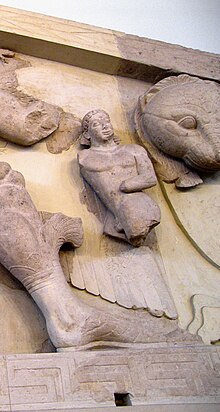Chrysaor
This article needs additional citations for verification. (May 2010) (Learn how and when to remove this template message) |
| Chrysaor | |
|---|---|
 Chrysaor, son of the Gorgon at the pediment of the Temple of Artemis in Corfu | |
| Personal information | |
| Parents | Poseidon and Medusa |
| Siblings | Pegasus |
| Consort | Callirrhoe |
| Children | Geryon and Echidna |
In Greek mythology, Chrysaor (Greek: Χρυσάωρ, Chrysáor, gen.: Χρυσάορος, Chrysáoros; English translation: "He who has a golden sword" (from χρυσός, "golden" and ἄορ, "sword")), the brother of the winged horse Pegasus, was often depicted as a young man, the son of Poseidon and the Gorgon Medusa. Chrysaor and Pegasus were not born until Perseus chopped off Medusa's head.[1]
Mythology[edit]
Medusa, one of the three Gorgon sisters, the most beautiful, and the only mortal one, was punished by Athena after being raped by Poseidon in the Temple of Athena.[2] Athena punished Medusa by turning her hair into snakes. Some versions of the story state that Athena also cursed her so that a pair of golden wings grew from her head. Chrysaor and Pegasus were said to be born from the drops of Medusa's blood that fell in the sea; others say that they sprang from Medusa's neck as Perseus beheaded her, a "higher" birth (such as the birth of Athena from the head of Zeus).
Chrysaor, married to Callirrhoe, daughter of glorious Oceanus, was father to the triple-headed Geryon, but Geryon was killed by the great strength of Heracles at sea-circled Erytheis beside his own shambling cattle on that day when Heracles drove those broad-faced cattle toward holy Tiryns, when he crossed the stream of Okeanos and had killed Orthos and the oxherd Eurytion out in the gloomy meadow beyond fabulous Oceanos.
In art Chrysaor's earliest appearance seems to be on the great pediment of the early 6th century BC Doric Temple of Artemis at Corfu, where he is shown beside his mother, Medusa.[3]
Notes[edit]
References[edit]
- Smith, William, Dictionary of Greek and Roman Biography and Mythology, London (1873). "Chrysaor"
- Ovid, Metamorphoses
External links[edit]
| This article relating to a Greek deity is a stub. You can help Wikipedia by expanding it. |